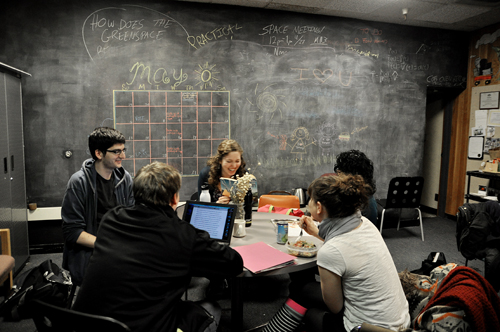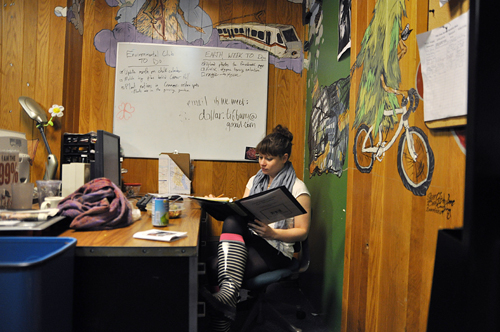The Portland State Environmental Club almost lost its meeting space. Located in the basement of Smith Memorial Student Union next to the Food for Thought Cafe, the club’s “green space” was going to be reallocated for a different use by the Smith space committee.
Environmental club saves the ‘green space’

The Portland State Environmental Club almost lost its meeting space. Located in the basement of Smith Memorial Student Union next to the Food for Thought Cafe, the club’s “green space” was going to be reallocated for a different use by the Smith space committee.
Kenzie Eiden, community development sophomore and Environmental Club co-coordinator, said that the club was informed of the reallocation by the Smith Sace Committee in early April.
The Smith Space Committee is a subcommittee of the Smith Advisory Board and is responsible for organizing student group meeting areas in certain parts of SMSU.
Sean Green, a graduate student in the Hatfield School of Government and SSC member, said that initially the committee proposed that the Environmental Club would be moved to a room on the SMSU mezzanine. The green space would be used by Portland State Professional Sound, the student group responsible for the “Live at Lunch” musical performances in the South Park Blocks.
Green said that the committee came to this decision because the green space was better suited to PSPS’ specific needs; being close to the elevator, having enough space for large equipment and having a room that locks to protect their expensive equipment.

According to Eiden, the loss of the green space—which the club has inhabited since 2009—would be detrimental to the club’s functioning. She said that if the club was put up in the mezzanine, prospective members would have to already know the club exists and have an intention to join, but the majority of Environmental Club members joined the club simply because they stumbled upon the green space on their way to Food for Thought.
“One of the benefits of being in the green space is that we have such an open door policy and a welcoming space, so students don’t feel intimidated to come in,” Eiden explained. “The loss of the room would decrease new membership and overall student engagement on campus because we have such a high visibility here and we form a kind of synthesis with Food For Thought Cafe.”
Economics junior Peter Daeges became a club member during fall term after he just walked into the green space.
“I saw the space, and I thought it looked like a cool room, so I stopped by. Through the Environmental Club, I have gotten involved with many other campus student groups that I otherwise wouldn’t have found,” Daeges commented.
Like Eiden, Daeges also believes that the loss of the green space would have negatively affected the Environmental Club.
“I think the club would be less successful because we use the space all the time. This room is a hub for a bunch of other student organizations. We are also right next to Food for Thought, who we partner with a lot,” Daeges said.
The Environmental Club’s main focus is on addressing environmental issues they see on campus and then conducting workshops, campaigns and work parties to improve the issues. The club’s biggest project, however, is organizing PSU’s Earth Week celebration, which occurred a few weeks ago.
The club has a fluctuating membership with 15 core members, and up to 30 part-time members. There are also students who aren’t officially in the club, but they simply hang out in the green space.
“We do work parties throughout the year and we do volunteer projects on campus. We do things like removing ivy in front of Cramer Hall, helping with the orchard that’s next to the community garden and running specific campaigns,” Eiden said.
Club coordinators did submit a formal appeal to the space committee including written testimonies by members recounting their positive experiences with the Environmental Club.
During an April 27 open forum, more than 30 club affiliates attended a meeting to voice their concern about the loss of the green space. According to Green, these efforts by the club were successful.
“After hearing from the Environmental Club and Portland State Professional Sound, we think we’ve come onto a different solution where we can keep the green space where it is and put PSPS in what is currently the Vanguard advertising office,” Green said. “The Environmental Club can stay there—we’ll still call it the green space, but we will probably put four additional groups there.”
Although the club was concerned about the possible loss of their meeting space, Eiden claimed that she also understood that the committee had a tough job to do.
“At first I thought it was all about the committee not looking at what the club does or who’s involved, but I realized that it’s also just an issue of space and limited resources, so regardless [the committee] has to problem-solve,” Eiden said.
According to Green, PSU has more than 100 student groups but fewer than two dozen offices available in SMSU. This year, for the 36 groups that requested office space, only about 12 offices were open for allocation.
Barring any major event, Green said, the committee is fairly certain the green space will continue to house the Environmental Club, but it will have to share the space. Eiden and the other club members are fine with that solution.
“The space was meant to be shared with like-minded clubs. For the future we would like to have other clubs officially having access to the space,” Eiden said.




